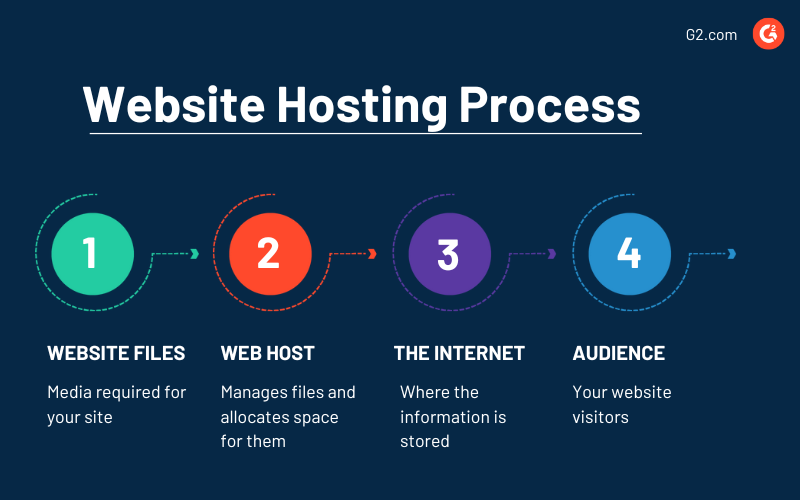If your company doesn’t have a digital presence, does it really exist?
It does, but you are doing your company a huge disservice by not creating a user-friendly and engaging website. Knowing how to make a website for your brand is an absolute must. There are a lot of steps to creating the perfect website, starting with deciding on a domain name.
Once you’re done with that step, choosing the best web hosting provider for you and your needs is next. Let’s take this one step at a time.
What is website hosting?
Website hosting is a service that allows organizations, companies, and individuals to create and host a website on the internet. Website hosting providers allocate a secure space on the internet for your website, where all files are maintained per your requirements.
Think back to your science lab sans the dissection bits. The specimens observed by generations of students are stored in one cupboard. If the internet is a science lab, the lab assistants and teachers become the web hosting providers.
Within our context, the website hosting platform is where your website physically lives. All sites on the internet need a web host to exist on the world wide web. These websites are hosted or stored on a unique type of computer called servers, making it possible for your website to be deliverable to visitors.
Web hosting services provide a specific amount of storage space where you’ll upload your HTML, CSS, and media files. Doing so allows the people of the internet to access information relating to your business.

Web hosting services typically offer various hosting plans to customers, which differ in support, access, and pricing levels, depending on your exact need. Some also offer managed hosting services, which provide advanced support services to their customers, including automated backups and security.
Types of web hosting services
In addition to the packages, features, and level of management offered by various web hosting services, there are also different types of web hosting services.
Shared hosting
When you choose shared hosting, your site is stored on the same server as other websites. Since you’ll be sharing the cost of the server with others, this option is best for beginners and those on a budget.
Let’s be honest, this route may save you money. However, it’s essential to consider that the resources on a shared hosting platform are limited. You could potentially run into problems if the servers have issues due to increased traffic or faulty code.
Think of an influx of students in a science lab, but we’re all in a group with little-to-no space for walking. Things could be crashing -- especially your specimens. Big yikes.
This option is not ideal. But when you’re starting or need to gauge your requirements, this is a great way to begin.
Virtual private server hosting
Virtual Private Server (VPS) hosting still shares sites on one physical server, but it houses them on multiple virtual machines separate from one another. Because there is typically a limit of 10-20 websites per server, the demand on each server isn’t as high as that on shared hosting servers, and you get to split all resources evenly. Due to this, VPS hosting is typically more expensive than shared hosting.
Each user gets their own set of resources, better scalability, and the ability to customize firewalls and other security protocols based on your unique website needs.
Think of a VPS host as an apartment building. All the tenants physically live in the same place, but we have control over how many locks we have on our doors. You don’t have to worry about breaking vases because your neighbors are having a party.
Dedicated hosting
As you may be able to tell from its name, a dedicated host is a server you have all to yourself. Let’s think of your website as a cake this time. It’s not on display with the other pastries, like shared or VPS hosting. But it has its own space for customers to look at until they decide whether they want a slice.
One of the advantages of going this route is that no other website can hog all of the resources or pose significant security threats. There is no cheesecake mixing with your apple pie.
However, renting a server that is entirely yours and yours alone is exponentially more expensive. And if your website is a slice or two of carrot cake, going for a smaller, shared web hosting provider is better.
Cloud hosting
Like VPS hosting, cloud hosting puts your site on a virtual machine. However, while VPS puts websites on one physical server, cloud hosts pull power from an entire network or computer to host your website.
One advantage of choosing cloud hosting is scaling your website based on your needs. Cloud hosting providers use several computers to create a powerful virtual server that can provide resources on a needed basis. Plus, you’re billed only for the resources you use. In this point of view: you are the cake boss.
Vous voulez en savoir plus sur Fournisseurs d'hébergement web ? Découvrez les produits Hébergement Web.
What are some web hosting services?
There’s no denying that there are a lot of web hosting services to choose from, and it can feel a little overwhelming to decide which one to use for your website.
Quick recap
Web hosting providers offer space on computer servers. These servers store and operate websites along with a connection to the internet so that visitors and potential customers can access your website.
So, their services can include managing the coding bits to even designing your website. There’s a website hosting provider for every business -- it all comes down to your needs.
How to choose a web hosting provider?
There are many service providers for every requirement, but finding one that ticks all boxes is crucial. And knowing your non-negotiables makes it a lot easier.
- Signup and renewal cost. Consider billing cycles and estimate how much you’d be willing to spend upfront and later.
- Customer support. Would you prefer a support executive that is available at all times? What are some ways you’d like to communicate with them?
- Management and maintenance. Would you prefer to fix any issues with the site or server yourself, or would you like to have a professional provided by the web host to help you?
- Customization. Would you prefer to customize your site by yourself whenever you want, without external intervention?
- Ease of setup. How quickly can you get your new site up and running?
These are just a few needs to consider when choosing a web hosting provider per your requirements.
What is self-hosting?
You can self-host your website if you aren’t interested in using a web hosting platform. When you self-host, you pay a web host company to provide a platform for your website so your audience can view it online. It’s great to be your mechanic, but only when you have the resources and workforce to change your website’s lightbulb.
Doing things this way means you own your website, and there are many capabilities to personalize it and make it your own. When you self-host, you can access your website files and the servers that store them.
Advantages of self-hosting
Like anything, there are pros and cons to going the route of self-hosting. Some advantages include the following:
- You can implement a design that is truly your own.
- Being able to add plugins or tools to improve the functionality of your site whenever you feel like it.
- Set up Google Analytics or other digital analytics software, gain access to Google Search Console to track traffic, and set up and establish other KPIs.
- The ability to monetize your site, add e-commerce tools, and create landing pages around specific products.
- The option to set up an email newsletter and have access to your visitor’s email addresses.
Disadvantages of self-hosting
There could be potential perils when things go awry with your site. Some of these include:
- You may not have the proper tools, or knowledge, to fully secure your website and run it on an HTTPS URL.
- You need to back up your website on your own time, which can save you if you experience any crashes or hackers in the future.
- If your site does experience any issues or goes down, it is all on you to get it back up and running again.
- Depending on how you go about self-hosting, it could be expensive. The price can range from free for non-profit organizations to several hundred dollars for a dedicated server.
We’re all baking cakes with wrenches in a science lab
The process of building a website can be daunting, as there are a lot of steps to consider. When deciding which direction to go with web hosting, keep these factors in mind and choose the option which you feel will work best for your business, brand, and the overall goal of your website.
Once you move on to building your website, you can learn about how PHP boosts website development and creates a secure experience for your audience.
This article was originally published in 2019. It has been updated with new information.

Mara Calvello
Mara Calvello is a Content and Communications Manager at G2. She received her Bachelor of Arts degree from Elmhurst College (now Elmhurst University). Mara writes customer marketing content, while also focusing on social media and communications for G2. She previously wrote content to support our G2 Tea newsletter, as well as categories on artificial intelligence, natural language understanding (NLU), AI code generation, synthetic data, and more. In her spare time, she's out exploring with her rescue dog Zeke or enjoying a good book.

